
Phyllis: This summer I had the opportunity to sail for a week in Lake Superior, so we are turning our thoughts to books about the sea (including the great inland sea that borders Minnesota, so vast it makes its own weather). If we can’t go sailing right now, we can at least read about it in a fleet of good picture books.
Jackie: And I am a self-confessed water gazer. I’m not a boater of any kind but I can’t get enough of being next to water, watching and listening.
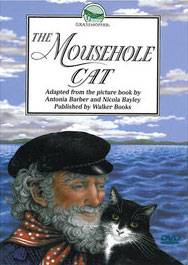
Phyllis: I cannot tell you how much I love The Mousehole Cat by Antonia Barber with luminous art by Nicola Bayley. As many times as I’ve read it, the story still gives me shivers and makes me want to cry. Mousehole (pronounced Mowzel by the Cornish people who live there) is a small town where the people go out every day through the narrow breakwater opening into the ocean to fish for their living. Old Tom and his cat Mowzer fish as well, for Mowzer in particular is partial to a plate of fresh fish.
One day a terrible winter storm blows in. “’The Great Storm-Cat is stirring,’ thinks Mowzer,” and although the Great Storm – Cat flings the sea against the breakwater and claws at the harbor gap, the boats are safe “as mice in their own mousehole,” but the people are hungry because no one can go out into the ocean to fish.
Finally, on Christmas Eve, Old Tom decides he should go out to try to fish, for he cannot stand to see the children starving at Christmas. Mowzer goes with him, “for he was only a man, she thought, and men were like mice in the paws of the Great Storm-Cat.”
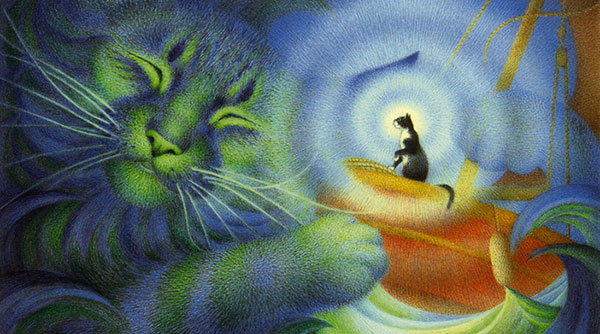
And it is Mowzer’s singing that distracts the Great Storm-Cat long enough for the boat to escape the harbor and play out the nets in the ocean. All day Mowzer sings to the Great Storm-Cat, but she knows he will strike when they run for the harbor and safety. As she thinks of the food they might make with the catch they have hauled in, Mowzer begins to purr, a sound the Great Storm-Cat has not heard since he was a Storm-Kitten. They purr together, the seas calm, and Old Tom and Mowzer come into the harbor on the “smallest, tamest Storm-Kitten of a wind” where the whole town is waiting with lit candles to guide them home. (Even writing this gives me shivers of delight.)
Every year since then the village of Mousehole is lit with a thousand lights at Christmas time, “a message of hope and a safe haven to all those who pass in peril of the sea.”
Jackie: The lit candles that guide them home after the adventure is such a wonderful touch. Don’t we all want to be guided home after a great struggle? The plot is so satisfying as well. It’s the small cat that saves them because she begins to purr. As I was thinking about Mowzer’s purr I realized how calming a cat’s purr is. I think we all become more relaxed if we have a purring cat on our lap. Same for the Great Storm Cat.
This is a lovely illustrated short story that I think would charm middle graders, as well as primary graders.
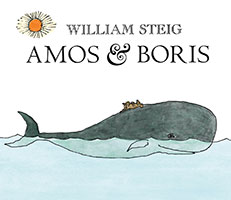 Phyllis: Another favorite is William Steig’s Amos and Boris, the story of a mouse who builds a boat, christens it the Rodent, provisions it with a delightful list of items, and sets sail on the ocean. Amos is less lucky than Old Tom and Mowzer; one night, gazing at the vast and starry sky while lying on his boat, he rolls overboard, and the Rodent in full sail bowls along without him. Amos manages to stay afloat through the night, leading to one of my favorite comforting lines in all of picture books: “Morning came, as it always does.” And with morning comes Boris the whale, just as Amos’s strength is failing. Boris gives Amos a ride home by whaleback, and on the weeklong journey they become “the closest possible friends.”
Phyllis: Another favorite is William Steig’s Amos and Boris, the story of a mouse who builds a boat, christens it the Rodent, provisions it with a delightful list of items, and sets sail on the ocean. Amos is less lucky than Old Tom and Mowzer; one night, gazing at the vast and starry sky while lying on his boat, he rolls overboard, and the Rodent in full sail bowls along without him. Amos manages to stay afloat through the night, leading to one of my favorite comforting lines in all of picture books: “Morning came, as it always does.” And with morning comes Boris the whale, just as Amos’s strength is failing. Boris gives Amos a ride home by whaleback, and on the weeklong journey they become “the closest possible friends.”
Jackie: I just love that!
Phyllis: When they near shore, Amos thanks Boris and offers his help if Boris ever needs it, which amuses Boris. He can’t imagine how a little mouse could ever help him.
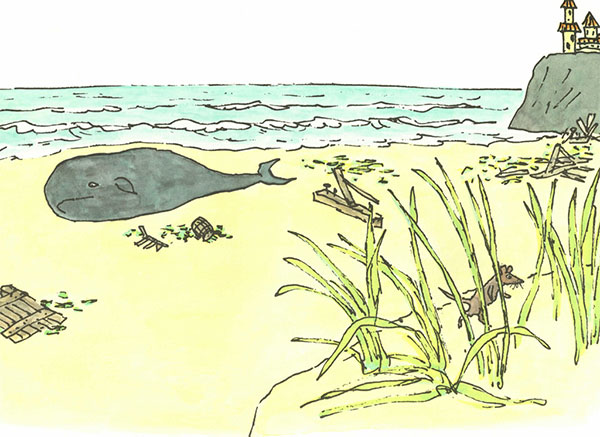
Years pass. Hurricane Yetta flings Boris ashore right by Amos’s house. Boris will die unless he gets back in the water, and Amos runs off to get help: two elephants who roll the whale back into the ocean while Amos stands on one of their heads, yelling instructions that no one can hear. Soon Boris is afloat again, whale tears rolling down his cheeks. Knowing they might never meet again, the friends say a tearful good-bye, knowing, too, that they will always remember each other.
In another writer’s hands, I might make some comment about the convenient “elephants ex machina” that Amos finds, but I accept it completely here, because Steig makes me believe. And cry, again.
Jackie: There is so much to love in this story. First, the list of items: cheese, biscuits, acorns, honey, wheat germ [Steig must have included wheat germ because he liked the sound. Wheat germ?] fresh water, a compass, a sextant, a telescope, a saw, a hammer and nails and some wood, … a needle and thread for the mending of torn sails and various other necessities such as bandages and iodine, a yo-yo and playing cards.” I just love the notion of a mouse on a boat practicing his yo-yo tricks. And I think readers will be called to ask themselves what they might find essential for a sea journey.
And I’m admiring of the nuanced way Steig moves the plot along. Amos doesn’t roll off the boat because he falls asleep, or because a high wind blows him off. He falls off because he is “overwhelmed by the beauty and mystery of everything.” His own capacity for awe is what causes the problem.
You have talked about the wonderful back and forth of helping between Amos and Boris. I want to mention, too, Boris’s wonderful voice. When the mouse meets the whale, he says. “’I’m a mouse, which is a mammal, the highest form of life. I live on land.’
‘Holy clam and cuttlefish!’ said the whale. I’m a mammal myself, though I live in the sea. Call me Boris,’ he added.” [A little nod to “Call me Ishmael?”]
Sometimes good luck happens. When the worst looks inevitable, fate intervenes. And sometimes fate gives us life-saving elephants. They are such a relief. And so outlandish. It’s as if Steig is saying, “I’m the author. I can do this.”
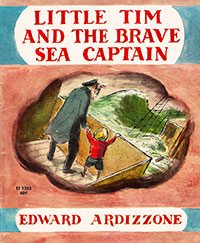 Phyllis: Edward Ardizzone wrote and illustrated a series of eleven books about Little Tim, who goes to sea, beginning with Little Tim and The Brave Sea Captain and ending with Tim’s Last Voyage. We loved these books when my children were growing up, and we still do. Visit this site so you can hear a sample of Little Tim and The Brave Sea Captain read aloud and see Ardizzone’s wonderful art.
Phyllis: Edward Ardizzone wrote and illustrated a series of eleven books about Little Tim, who goes to sea, beginning with Little Tim and The Brave Sea Captain and ending with Tim’s Last Voyage. We loved these books when my children were growing up, and we still do. Visit this site so you can hear a sample of Little Tim and The Brave Sea Captain read aloud and see Ardizzone’s wonderful art.
Jackie: I love the language of this book: “’Sometimes Tim would astonish his parents by saying, ’That’s a Cunarder’ or ‘Look at that barquentine on the port bow.’” [I want to say that again and again.] When his parents say he is much too young to go to sea, Tim is “so sad that he resolved, at the first opportunity, to run away to sea.”
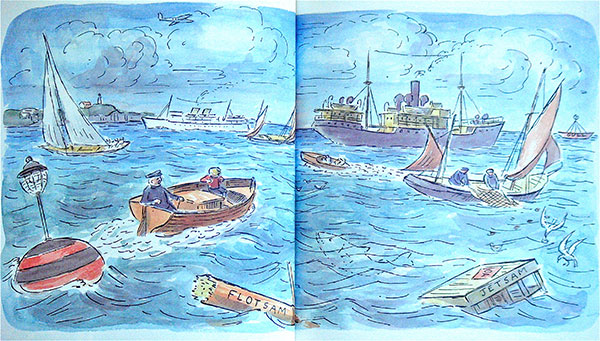
But best of all, I had the sense throughout this story that the storyteller was going to give me a wonderful yarn and that, with or without elephants, Little Tim was going to get through this adventure safely.
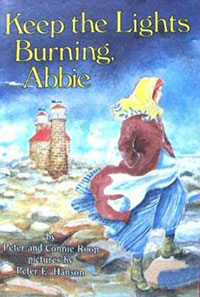 Phyllis: Keep the Lights Burning, Abbie by Peter and Connie Roop is a book for those who pass in peril of the sea. Based on the true story of 16-year old Abbie Burgess, whose father was the lighthouse keeper on Matinicus Rock off the coast of Maine, the book tells how Abbie’s father heads out one morning to get much needed supplies from Matinicus Island and is storm-bound there for weeks before he can return. Abbie takes care of her three younger sisters and her ailing mother and “keeps the lights burning” so that ships can pass safely by. She lights the lamps, scrapes ice off the windows so the lights can be seen, trims wicks, cleans lamps, fills them with oil, and saves her chickens when waves threaten to wash them away, all until her father can safely sail back to the lighthouse. A wonderful strong character for girls and boys to know about.
Phyllis: Keep the Lights Burning, Abbie by Peter and Connie Roop is a book for those who pass in peril of the sea. Based on the true story of 16-year old Abbie Burgess, whose father was the lighthouse keeper on Matinicus Rock off the coast of Maine, the book tells how Abbie’s father heads out one morning to get much needed supplies from Matinicus Island and is storm-bound there for weeks before he can return. Abbie takes care of her three younger sisters and her ailing mother and “keeps the lights burning” so that ships can pass safely by. She lights the lamps, scrapes ice off the windows so the lights can be seen, trims wicks, cleans lamps, fills them with oil, and saves her chickens when waves threaten to wash them away, all until her father can safely sail back to the lighthouse. A wonderful strong character for girls and boys to know about.
Jackie: There is something so alluring about lighthouses and islands. I wonder how many kids have fantasies of living in a lighthouse on an island. I sure did. I really enjoyed the matter-of-fact tone of this story. As Abbie is first lighting the lamps a match blows out, but the next one doesn’t, nor the next and she goes on to light them all, night after night for a month. No drama, just a telling of what she did. No drama but touching emotion at the end when we learn that her father was watching for those lights every night as evidence that his family was still there. That detail almost made me tear up.
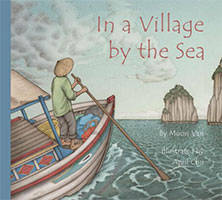 Phyllis: We could sail on through sea story after sea story. A more recent book, In a Village by the Sea by Muon Van is a elegantly simple and lovely story that begins, “In a fishing village by the sea there is a small house.” Each page moves closer in, from the house to the kitchen to the fire to a pot of soup to a woman watching the soup to a sleepy child to a dusty hole in the floor where a cricket is humming and painting a picture of a fisherman in his storm-tossed boat hoping for the storm to end so that he can return to his village by the sea where in a small house, his family waits for him to come home. April Chu’s beautiful art concludes the book with the cricket painting a picture of that fisherman and his boat sailing home into a calm harbor.
Phyllis: We could sail on through sea story after sea story. A more recent book, In a Village by the Sea by Muon Van is a elegantly simple and lovely story that begins, “In a fishing village by the sea there is a small house.” Each page moves closer in, from the house to the kitchen to the fire to a pot of soup to a woman watching the soup to a sleepy child to a dusty hole in the floor where a cricket is humming and painting a picture of a fisherman in his storm-tossed boat hoping for the storm to end so that he can return to his village by the sea where in a small house, his family waits for him to come home. April Chu’s beautiful art concludes the book with the cricket painting a picture of that fisherman and his boat sailing home into a calm harbor.
Jackie: This book is so artful and so satisfying in the way we circle in on the story and then circle back out. And I agree about April Chu’s illustrations. They are wonderfully expressive. I almost expect the dog to talk.
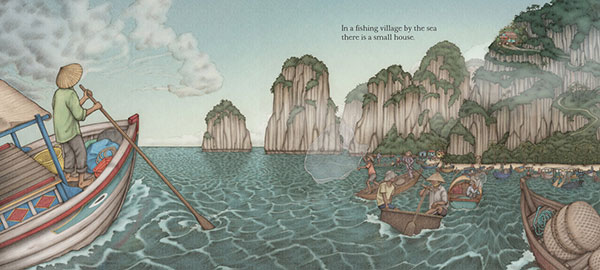
Thanks for choosing these books, Phyllis. I’m sitting at my desk on a quiet, cloudy day but feel as if I have been on adventures. My head is stretched, and I look at my house and yard with new appreciation. The sea, or stories about the sea, take us out of our lives, our kitchens, toss us around a bit, and with hope and help — and occasional elephants — bring us back home, where, as Little Tim might say, we are ever so glad for warmth and chocolate.
